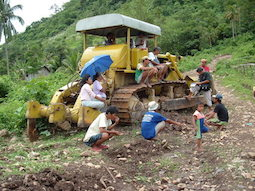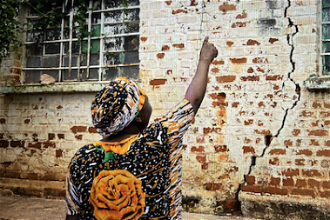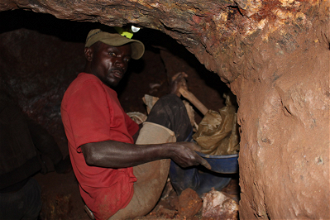Growing network supports communities devastated by mining

Community in Philippines block drilling machine from mining company
The London Mining Network held its 2020 AGM last week using a Zoom meeting. The network works in solidarity with communities around the world harmed by London-linked mining companies. From the beginning, it has had close links with the Church. Member groups include the Columban Missionary Society and the Ecumenical Council for Social Responsibility. It is part-funded by the Passionists.
At the AGM, LMN Co-ordinator Richard Solly summarised the year's activities: "First the bad news. We did not bring an end to the ravages of extractivism, the multiple injustices, forced removals of communities, violation of culture, loss of livelihoods, death threats against mining critics, catastrophic legacy of mining waste, use of dangerous tailings dams, acceleration of climate chaos or the prioritisation of financial profit over virtually every other consideration.
We did not make ourselves unnecessary. We did continue to offer our solidarity to mining-affected communities and mine workers around the world, amplifying their voices by bringing their demands and concerns, and on occasion their representatives, to London. We did continue to encourage them in their struggles because they knew they have friends here in the financial heart of darkness where so many decisions affecting them are made. We did strengthen their hand by ensuring that the violations of their rights and dignity by London-linked mining companies did not go unreported here. We know these things because our friends have told us so.
We extended our reach on social media, expanded our education project and increased our team of volunteers. Our website was redesigned under the direction of Communications Coordinator Lydia James and has attracted very positive comments. New educational materials were developed by Education Coordinator Kerima Mohideen. We informed more people, created greater awareness and enthused more young people to work on the issues.
We have started making links with more academic institutions. We explained in greater technical detail the risks posed by tailings dams, helped lobby European parliamentarians, investors and the United Nations about mining waste, and assisted with multiple lawsuits against mining companies. We drew attention to the pitfalls of relying on increasing use of renewable energy, rather than on reduction of energy use, as the way forward, and ensured that more and more people in the climate movement in this country are aware of the need to put the demands and concerns of mining-affected communities, especially in the global south, at the centre of work to end fossil fuel use.
We continued to embarrass mining companies in front of their shareholders at company AGMs and put greater emphasis on informing institutional shareholders of the destructive impacts of their investments, helped by a new co-operative relationship with the Local Authority Pension Fund Forum. We played a central role in the building up of an international alliance of networks working for justice in the mining industry, for the right to say no to mining, and for a just transition to a post-extractivist economy.
Our work with mining-affected communities is arranged sometimes directly but more often through our member groups or through national organisations working with those communities. This year we have worked in this way with people in Australia, Bangladesh, Bougainville, Brazil, Chile, Colombia, Ecuador, Eritrea, India, Indonesia, Madagascar, Mongolia, Peru, the Philippines, Romania, Russia, South Africa, Spain, Sweden, the USA and West Papua as well as in the UK and Ireland.
We were present during 2019 inside and outside the AGMs of Lonmin, Anglo American, Rio Tinto, Antofagasta, Beowulf and BHP. We assisted visitors from the US at the Rio Tinto AGM in April and hosted a speaker tour around the BHP AGM in October with representatives of communities in Brazil, Chile and Colombia. In addition to street activity outside AGMs, we organised a vigil outside the Brazilian Embassy after the January tailings dam collapse at Brumadinho and handed in a letter at BHP's offices in November on the fourth anniversary of the Samarco tailings dam collapse.
We published several reports, including 'A Just Transition is a Post-extractive Transition' by Benjamin Hitchcock. We worked with colleagues around the world to help produce the recent report 'Voices from the Ground: how the global mining industry is profiting from the COVID-19 pandemic'."
LINKS
London Mining Network - https://londonminingnetwork.org/
Reports at: https://londonminingnetwork.org/reports/
Annual report on the LMN website at https://londonminingnetwork.org/wp-content/uploads/2020/04/LMN-2019-Accounts-TAR-.pdf.


















